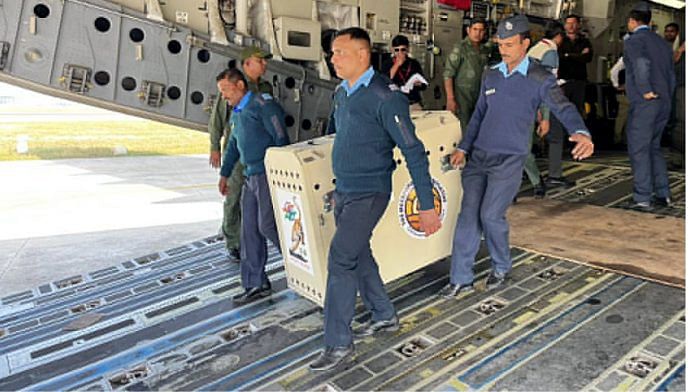New Delhi: Twelve South African cheetahs landed in Madhya Pradesh’s Kuno National Park Saturday, taking the total tally of cheetahs in India to 20, and marking the end of the first step that seeks to revive the species within the country and contribute to conservation efforts worldwide.
The cheetahs reached Gwalior airport early Saturday morning on an Indian Air Force C-17 Globe Master plane, and were then transported via helicopter to Kuno where they were released into quarantine enclosures.
“All twelve cheetahs are doing well, and I will be in Kuno to monitor them for two weeks,” Vincent Van Der Merwe, South African cheetah expert with conservation organisation, The Metapopulation Initiative, told ThePrint soon after the plane landed in India.
The cheetahs were released into their quarantine enclosures by Madhya Pradesh chief minister Shivraj Singh Chauhan and Union environment minister Bhupender Yadav.
Chouhan said, “Madhya Pradesh has got a gift on Mahashivratri. I thank PM Modi, it is his vision. 12 Cheetahs will be rehabilitated to Kuno. The Cheetahs that had come earlier have now adapted to the situation very well.”
The decision to translocate cheetahs from Namibia and South Africa has been decades in the making, with the objective of establishing a free ranging, wild population within the country after they were declared extinct in 1952. The government also hopes the introduction of the cheetah to India will save its vanishing grassland ecosystems.
After spending a minimum of 30 days in quarantine, the cheetahs will be moved to larger fenced enclosures – following in the steps of their Namibian counterparts – before being released into the wild in earnest. Their survival in the wild will be the biggest test of the project’s success, experts have said.
A consultative workshop with international cheetah experts, scientists, veterinarians, and forest officials will take place on 20 February at Kuno National Park, the outcome of which “will pave the way for better cheetah management and will help in successfully establishing cheetah metapopulation in India,” a government statement said.
Also read: Mumbai among cities facing biggest threat as global sea levels rise, warns UN agency WMO
Big cats from SA
The South African cheetahs comprise seven males and five females ranging from ages of 21 months to eight years, all of whom have been certified to be in “excellent” condition by The Metapopulation Initiative, which is coordinating the translocation this time.
The cheetahs have been sourced from reserves across South Africa and have been in quarantine since June 2022, pending the final agreement with India which was delayed by several months.
The agreement, which was finally signed on 27 January by both governments, states that India will receive 12 cheetahs from South Africa every year for the next eight to 10 years for the purpose of establishing a viable metapopulation within the country.
“It is because of South Africa’s successful conservation practices that our country is able to participate in a project such as this – to restore a species in a former range state and thus contribute to the future survival of the species,” said South Africa Minister of Forestry, Fisheries and the Environment Barbara Creecy in a statement Friday.
According to The Metapopulation Initiative’s Risk Management Plan, which ThePrint has seen, “Genetic evidence accumulation since the 1980s has indicated that between 500 and 1000 individuals are required to ensure evolutionary potential for fitness in perpetuity (Frankham et al. 2014). The reintroduced populations in India will need to form part of the managed metapopulation until such numbers are achieved. This will require long term commitment by South African and Namibian authorities to provide unrelated cheetahs for relocation to India.”
Namibian cheetahs await release into wild
The first batch of Namibian cheetahs which was brought to India on 18 September 2022 has been living in large, fenced enclosures after their “soft” release from quarantine over two months ago.
According to the ‘Action for Cheetah Introduction Plan’ prepared by the Wildlife Institute of India, the cheetahs will eventually be released from the enclosures and into the wild in a phased manner, “after an appropriate period (1-2 months).” However, officials declined to comment on how soon this would happen.
(Edited by Smriti Sinha)
Also read: India’s green hydrogen dream: Businesses are raring to go clean, but cost, safety are concerns



